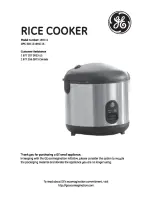
How it works
en
27
Meal
Accessory/cookware Shelf posi-
tion
Type of
heating
Temperature
in °C
Cooking
time,
minutes
Bake, sweet
Ovenproof dish
2
180–200
50–60
Potato gratin, raw ingredients, 4 cm
deep
Ovenproof dish
2
160–180
60–80
18.9 Poultry, meat and fish
The table lists values for poultry, meat and fish, with de-
fault values for the weight.
If you prepare dishes that are larger or heavier than
what is specified in the recommended settings, always
use the lower temperature. If cooking more than one
item, use the weight of the heaviest item as a basis for
determining the cooking time. The individual pieces
must be approximately the same size.
Roasting and grilling on the wire rack
Roasting on the wire rack works particularly well for
large poultry or for multiple pieces at the same time.
¡
Depending on the size and type of the food to be
roasted, add up to 1/2 litre water to the universal
pan.
You can make a sauce from the juices that are col-
lected. This also means that less smoke is pro-
duced and the cooking compartment does not be-
come as dirty.
¡
Keep the appliance door closed when using the
grill.
Never grill with the appliance door open.
¡
Place the food to be grilled on the wire rack. In ad-
dition, slide the universal pan in at least one shelf
position lower, with the slanted edge facing the ap-
pliance door. This means that any dripping fat is
caught.
Roasting in cookware
If you cook food in cookware, you can remove it from
the cooking compartment more easily and serve it dir-
ectly in the cookware. If you cover the cookware when
you cook your food, this will keep the cooking compart-
ment cleaner.
General information about roasting in cookware
¡
Use heat-resistant, ovenproof cookware.
¡
Place the cookware onto the wire rack.
¡
Check in advance whether the cookware fits in the
cooking compartment.
¡
Glass cookware is best.
¡
Shiny roasting dishes made from stainless steel or
aluminium are not ideal. They reflect the heat like a
mirror. The food cooks more slowly and does not
brown as well. Increase the temperature accordingly
and extend the cooking time.
¡
Follow the manufacturer's instructions for your roast-
ing dishes.
Cookware without lid
¡
Use a deep roasting dish.
¡
Place the cookware onto the wire rack.
¡
If you do not have any suitable cookware, use the
universal pan.
Cookware with lid
¡
Use a suitable lid that seals well.
¡
Place the cookware onto the wire rack.
¡
Meat, poultry and fish can also become crispy in a
covered roasting dish. Use a roasting dish with a
glass lid for this. Select a higher temperature.
WARNING ‒ Risk of injury!
If hot glass cookware is placed on a wet or cold sur-
face, the glass may shatter.
▶
Place hot glass ovenware on a dry mat after cook-
ing.
WARNING ‒ Risk of scalding!
Very hot steam may escape when the lid is opened
after cooking. Steam may not be visible, depending on
the temperature.
▶
Lift the lid in such a way that the hot steam can es-
cape away from you.
▶
Keep children away from the appliance.
Notes on roasting and grilling
The setting values are based on the assumption that
unstuffed, chilled, ready-to-roast poultry, meat or fish is
placed into a cold cooking compartment.
¡
The larger the poultry, meat or fish, the lower the
temperature and the longer the cooking time.
¡
Turn the poultry, meat or fish after approx. 1/2 to
2/3 of the time listed.
¡
Add a little liquid to the poultry in the cookware.
Cover the base of the cookware with approx. 1–
2 cm of liquid.
¡
When you turn poultry, ensure that the breast side
or skin side is underneath to begin with.
¡
Use tongs to turn the pieces of food you are grilling.
If you pierce the meat with a fork, the juices will run
out and it will become dry.
¡
Only add salt to steaks once they have been grilled.
Salt draws water from the meat.
Tips for poultry, meat and fish
Observe the instructions when preparing poultry, meat
and fish
Poultry
¡
For duck or goose, pierce the skin on the underside
of the wings. This allows the fat to drain out.
¡
If using duck breast, score the skin. Do not turn
duck breasts.
¡
Poultry will turn out particularly crispy and brown if
you baste it towards the end of the roasting time
with butter, salted water or orange juice.
Meat
¡
Coat lean meat with fat as required, or separate the
pieces.
¡
When roasting, add a little liquid if the meat is lean.
Cover the base of the glass cookware with ap-
prox. 1/2 cm of liquid.










































